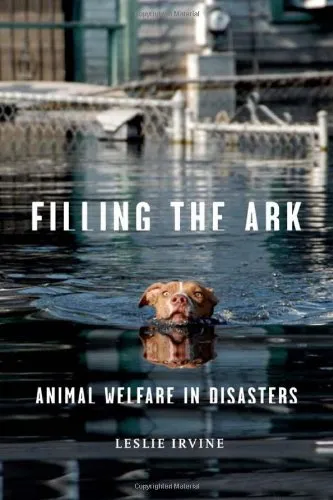Filling the ark: animal welfare in disasters
4.5
Reviews from our users

You Can Ask your questions from this book's AI after Login
Each download or ask from book AI costs 2 points. To earn more free points, please visit the Points Guide Page and complete some valuable actions.Welcome to the comprehensive introduction to "Filling the Ark: Animal Welfare in Disasters," a book that sheds light on the intersection of animal welfare and disaster management. This book, authored by Leslie Irvine, addresses the often-overlooked issue of how disasters impact animals and examines the necessary steps to mitigate these impacts. In this introduction, we provide a detailed summary, key takeaways, notable quotes, and reasons why this book is crucial in today's context.
Summary of the Book
In "Filling the Ark: Animal Welfare in Disasters," Leslie Irvine explores the critical yet underrepresented topic of animal welfare during catastrophic events. With a meticulous analysis of various disaster scenarios, Irvine highlights how animals, ranging from pets to livestock, face perilous situations when disasters strike. The ark metaphor signifies the need to create comprehensive plans that ensure animals are not forgotten when emergencies occur.
Irvine investigates the bonds between humans and animals, emphasizing how these relationships can exacerbate the emotional toll of disasters on human populations. By examining real-life case studies from events like hurricanes, earthquakes, and fires, the author articulates the challenges faced by emergency response teams and animal welfare advocates. "Filling the Ark" argues for the inclusion of animals in disaster planning at all levels of governance to mitigate suffering and improve outcomes for both animals and humans.
Key Takeaways
- Disaster plans often neglect animal welfare, leading to significant ethical and practical implications.
- The human-animal bond plays a critical role in disaster scenarios, affecting evacuation decisions and long-term mental health for survivors.
- Effective disaster response must incorporate strategies for animal welfare to ensure comprehensive and humane management.
- Collaboration between animal welfare organizations and emergency management agencies is essential for creating effective policy frameworks.
Famous Quotes from the Book
"In disasters, the vulnerability of animals reflects the vulnerability of humans, highlighting the need for a synchronized approach to welfare for all living beings."
"The ark metaphor signifies a collective responsibility, reminding us that in times of crisis, no species should be left behind."
"Our relationships with animals demand that we consider their fate during disasters, shaping policies that reflect our ethical obligations."
Why This Book Matters
"Filling the Ark" is a pivotal work because it expands the discourse on disaster management to include non-human lives, which are often forgotten in crisis planning and response. It presents a compelling argument for more inclusive disaster policies that consider animal welfare as a critical component of human welfare. Given the increasing frequency and intensity of natural disasters due to climate change, this book highlights an urgent need for policy reform and increased awareness of the connections between human and animal welfare.
By expanding the conversation around disasters to include the welfare of animals, Leslie Irvine’s book serves as a catalyst for change, urging governments, organizations, and individuals to take action. It functions as a vital resource for policymakers, researchers, emergency managers, and animal welfare advocates, providing insights that can lead to more ethical and effective disaster response strategies.
Free Direct Download
You Can Download this book after Login
Accessing books through legal platforms and public libraries not only supports the rights of authors and publishers but also contributes to the sustainability of reading culture. Before downloading, please take a moment to consider these options.
Find this book on other platforms:
WorldCat helps you find books in libraries worldwide.
See ratings, reviews, and discussions on Goodreads.
Find and buy rare or used books on AbeBooks.


